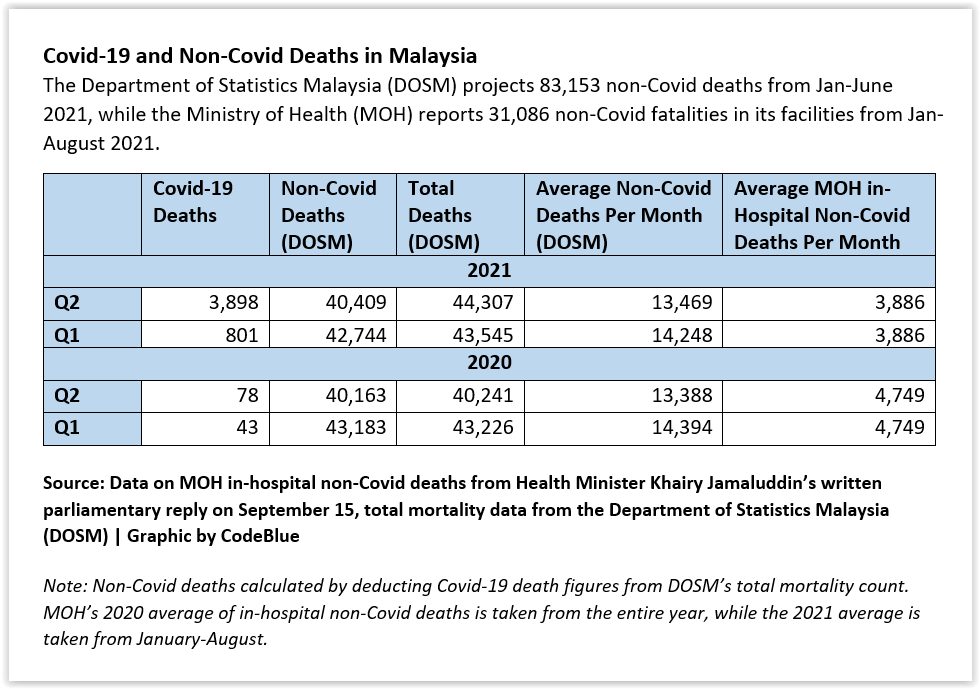KUALA LUMPUR, Sept 17 — The Ministry of Health (MOH) reported that non-Covid deaths did not increase during the coronavirus pandemic, which saw public hospitals over-run with Covid-19 patients, and that fatalities in fact fell instead.
According to Health Minister Khairy Jamaluddin, the Ministry of Health (MOH) reported 31,086 non-Covid in-hospital deaths in the first eight months of this year from January to August.
However, based on official mortality data projected by the Department of Statistics Malaysia (DOSM), Malaysia saw 83,153 potential non-Covid deaths in the first six months of 2021 from January to June alone. CodeBlue calculated non-Covid death data by excluding Covid-19 deaths from DOSM’s total mortality count.
Based on DOSM projected data, the monthly average of non-Covid deaths in the first half of 2021 stood at 13,859 cases, 3.6 times higher than the 3,886 monthly average of in-hospital non-Covid deaths in MOH facilities for the current year from January to August.
Khairy, in a parliamentary written reply on Wednesday, said total in-hospital deaths involving non-Covid patients in 2019 amounted to 62,258, followed by 56,988 last year, and 31,086 from January to August this year. This equates to 5,188 average deaths per month in 2019, and 4,749 per month last year, as well as 3,886 per month up until August this year.
“Based on this statistic, there has been no increase in mortality of non-Covid-19 patients in MOH hospitals from 2019 until August this year. However, there have been ‘deaths by Covid-19’ among individuals with comorbidities,” he said.
He was responding to a question from Bandar Kuching MP Dr Kelvin Yii Lee Wuen on the government’s projection and plan to deal with an increase of cases and deaths of non-Covid patients.
MOH’s non-Covid mortality statistics are solely derived from people who died in public health facilities. DOSM’s mortality data, however, includes deaths that occurred in people’s homes that are recorded by the police.
DOSM projected 44,307 deaths in the second quarter this year from April to June, a 10 per cent increase from 40,241 deaths reported over the same period last year.
At the same time, MOH data showed 3,898 Covid-19 deaths recorded in the April-June period (this data was taken from the Health director-general’s website).
This means there were 40,409 non-Covid deaths, or an average 13,469 non-Covid deaths per month in the second quarter of 2021.
Overall population deaths in the second quarter of 2020 stood at 40,241, during which MOH reported 78 Covid-19 deaths. This suggests a total of 40,163 non-Covid deaths, or 13,388 non-Covid deaths on average per month, in the second quarter last year.
In the first quarter this year, DOSM projected 43,545 overall population deaths, while MOH recorded 801 Covid-19 deaths — creating a difference of 42,744 deaths which presumably are non-Covid fatalities. This translates to an average of 14,248 non-Covid deaths per month from January to March.
Overall population deaths in the first quarter of 2020 were projected at 43,226, during which MOH reported 43 Covid-19 deaths. This suggests a total of 43,183 non-Covid deaths, or 14,394 non-Covid deaths on average per month, in the first quarter last year.
When combining quarterly figures, slightly fewer people died from non-Covid causes in the first half of 2021 at 83,153 cases, compared to 83,346 cases in the first half of 2020.
DOSM projected that more people died in the second quarter of 2021 compared to the first quarter, at 44,307 versus 43,545. This is due to the huge increase of Covid-19 mortality as 3,898 official coronavirus-related deaths were recorded from April to June, compared to just 801 in January to March. However, more non-Covid deaths were projected by DOSM in the first quarter at 42,744 cases, compared to 40,409 cases in the second quarter.
Khairy told Dr Yii in the Dewan Rakyat despite the pandemic, MOH continued to provide treatment and other health services to patients, especially emergency and partial emergency cases.
MOH undertook several measures which included extending the hours of operation theatres and specialist clinics in certain hospitals, optimising the use of non-specialist and military hospitals for certain medical procedures, and mobilising medical specialists from public and private hospitals to facilities that do not provide such specialist services.
Khairy said MOH also outsourced certain services to private hospitals and made online services, such as virtual clinics, available.
Malaysia’s Covid-19 epidemic peaked on February 4 in the first wave, while the second wave peaked on June 3, based on average daily cases, according to global tracker Our World In Data.
In April, CodeBlue reported infectious disease consultant Dr Benedict Sim Lim Heng from Sungai Buloh Hospital saying that Malaysia’s low Covid-19 death rate of 0.4 per cent as of April 12 “doesn’t mean anything” as Covid-19 patients who die post-recovery — either from complications due to lengthy hospitalisation or from persistent effects of the disease — are not officially classified as Covid-19 deaths.
Dr Sim also pointed out that Sungai Buloh Hospital was already a “very busy hospital” prior to the pandemic before it was turned into a full Covid-19 facility.
“When Hospital Sungai Buloh converted to a full Covid hospital, all these patients had to go elsewhere and understandably, there’ll be some patients actually at a disadvantage because this whole Covid thing has taken up a lot of resources, space, and they get left behind.
“Some of the cases have even resulted in death. So there are other indirect causes of deaths due to this Covid outbreak.”
A global study by CovidSurg Collaborative that was published in the British Journal of Surgery in May last year projected a backlog of 151,717 surgeries in Malaysian hospitals during a 12-week period of hospital services’ disruption due to the Covid-19 epidemic.
The study revealed that 70.9 per cent of overall surgeries, including benign diseases, cancer surgery and obstetrics, were cancelled during the early stages of Malaysia’s Covid-19 outbreak and Movement Control Order (MCO) conditions last year.








